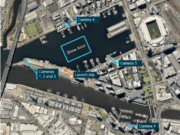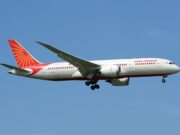Today’s suspension of flights to and from London’s Gatwick Airport sparked warnings from the airport and the U.K. Civil Aviation Administration (CAA) and calls for tougher laws from organizations representing airlines and pilots.
All flights to and from Gatwick were suspended around 2100 local time Wednesday until at least 1600 local time today after drones were reported repeatedly flying over the airfield, airport officials said, describing the presence of the drones as “what appears to be a deliberate attempt to disrupt flights.”
Published reports quoted airport officials as saying that the closure affected 10,000 would-be passengers overnight Wednesday and could affect up to 110,000 today, and that Gatwick would not be reopened “until it was safe to do so.” In a news release dated Dec. 17, the Gatwick Airport Press Office said 2.9 million passengers were expected to travel through airport during the Christmas holiday period. Gatwick is the U.K.’s second largest airport.
The CAA, in a series of statements on Twitter, said that flying drones near airports is “totally unacceptable … and anyone flouting the rules can face severe penalties, including imprisonment.” The agency said that it considers the event “an extraordinary circumstance,” which means that airlines are not required to compensate passengers affected by the canceled or delayed flights.
In a statement issued Thursday, the European Regions Airline Association (ERA) urged authorities to take “necessary steps … to prevent the flying of unregulated drones near airports and aircraft” and to implement “more robust and harmonised … safety regulations” throughout the European Union.
“The use of drones by an individual with little knowledge of airport and airspace infringement and/or disregard to aviation safety in general can cause both major disruption and pose a serious threat to the safety of an aircraft,” the ERA said. “From impact on windshields to being ingested by an aircraft engine, the result could be catastrophic.”
ERA Director General Montserrat Barriga said the use of geo-fencing to prevent drones from entering airport airspace would help prevent similar incidents, as would the creation of larger no-fly zones around airports and the implementation of tougher laws.
Rob Hunter, head of flight safety for the British Airline Pilots Association, also endorsed the call for tougher laws and stricter enforcement of existing requirements to keep drones away from manned aircraft.
“We need the registration and education process in force sooner rather than later, so people flouting the law can be caught and prosecuted,” Hunter said. “We need to ensure people flying drones take responsibility for their actions and do so … with the knowledge that if they endanger an aircraft, they could face jail.”


